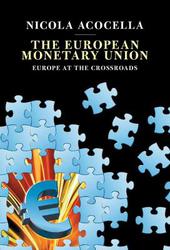
|
The European Monetary Union: Europe at the Crossroads
Hardback
Main Details
| Title |
The European Monetary Union: Europe at the Crossroads
|
| Authors and Contributors |
By (author) Nicola Acocella
|
| Physical Properties |
| Format:Hardback | | Pages:300 | | Dimensions(mm): Height 240,Width 160 |
|
| Category/Genre | Macroeconomics
Political economy
Economic history
Banking |
|---|
| ISBN/Barcode |
9781108840873
|
| Classifications | Dewey:337.142 |
|---|
| Audience | | Professional & Vocational | | Tertiary Education (US: College) | |
|---|
| Illustrations |
Worked examples or Exercises
|
|
Publishing Details |
| Publisher |
Cambridge University Press
|
| Imprint |
Cambridge University Press
|
| Publication Date |
27 August 2020 |
| Publication Country |
United Kingdom
|
Description
The European Union is at a crossroads. This book analyzes the historical roots of the EU's monetary and financial institutions in order to better understand its struggle to maintain an economic and monetary union, as well as the ongoing problems facing the Euro. The institutions of the EU are based on the operation of free markets, a common monetary policy, and the European Central Bank. These founding policies have created many of the imbalances at the root of the ongoing European recession. Reemerging threats of populism and localism are poised to further disintegrate the European construction and may spark fierce opposition between countries. Acocella engages with these risks, suggesting detailed actions for reform within the EU and its institutions that may steer it away from further conflict, allowing it to better serve its member states and citizens.
Author Biography
Nicola Acocella is Emeritus of Economic Policy at the Sapienza University of Rome. He is the author of Rediscovering Economic Policy as a Discipline (Cambridge, 2018) and co-author of Macroeconomic Paradigms and Economic Policy (Cambridge, 2016), among other books.
Reviews'This is an excellent book on the economic, financial, and institutional integration of Europe, its crisis periods, challenges and misguided directions, initiated by wrong policies. The author very competently takes on those issues and points to better economic policies for the European Union. If one wants to understand what went wrong and what should be done better one should read this book.' Will Semmler, The New School for Social Research
|